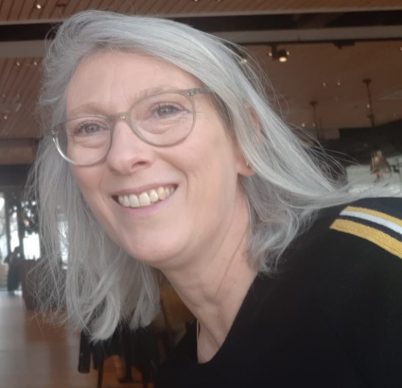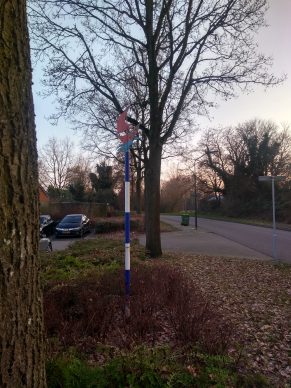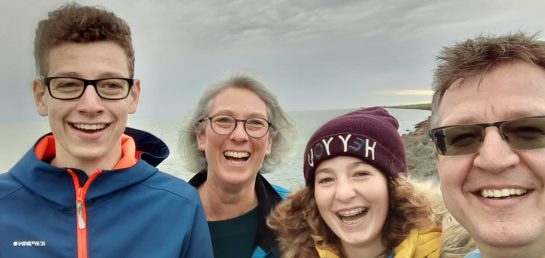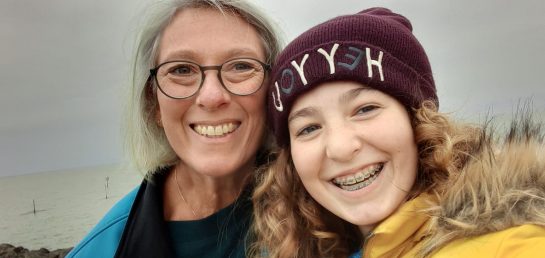Sheila Prins-Knight lives in the Netherlands and participates in her small church branch. When she had cancer, her branch rallied around her and her family, which reinforced her understanding that the gospel is about service and sharing the love of Christ.
Could you tell us about yourself?

Sheila Prins-Knight
I’m 46 years old. I was born in England to a Dutch mother and an English father, who was from a Jewish upbringing. He had Jewish parents and was raised as a liberal Jew. As an adult, he joined the Church. My parents met each other in church and got married. But when I was seven, my mom decided that it wasn’t wise to stay with my father. He was mentally ill – he suffered from schizophrenia but didn’t take his medication and brought the family into difficult situations. So my mom decided to take us away. She went back to Holland and took me, my brother, and my sister with her. So I was raised for the most part in Holland, in Lelystad, where I live now.
What is Lelystad like?
Lelystad used to be water. Before 1960, it was a sea. But they regained the land and pumped away the water. It’s really clay ground here, where we live, and they built this city. We have a little museum and things that tell about this past here, and we have two statues in the center – one of Mr. Lely, who designed the city and had the idea for it, but it was built after he died. The other statue sets a line where the level of the sea used to be – in Lelystad, it is 4.8 meters high. It’s not the only city on reclaimed land, the whole province has been reclaimed. Throughout the province, you will see markers, like a long pole and it will have the symbol of an airplane or a ship. When they reclaimed the land, on the bottom of the sea, that object was found – a ship or an airplane. So that’s cool. I don’t even pay notice to it anymore. For us, it’s normal.

A marker for where a ship was found
We have the dikes close by. We know there might be moments that the dike will break and we will have to flee, especially with all the things that have been prophesied in the last days, so we have our backpacks in the attic, ready to leave. It has never happened here. It has happened in another part of Holland, in the south in 1953, and a lot of people died. Since then, they really worked hard to make strong dikes, so we’ll see what happens.
Did you use Church materials to prepare, or does your local government help support preparation like that? If your province was flooding and underwater, where would you go?
I have no idea. I think we would go to the roof of the house and sit there and wait until help comes. That’s the only thing you can do. We live really close by the dike. I mean, it’s a 10 to 15 minute bike, so with flooding, you don’t have time to get in your car. You just have to go up.
The government really doesn’t pay any attention to those kinds of things here. It’s a personal matter. It’s because of what we learn in church to be prepared and to have a year supply, the 72-hour backpacks ready, that we do that. I talked to a friend about it recently. She said, “My dad, he’s mad. He has all the storage, and all these things for something might happen.” And I said, “Well, actually we have it as well. We learn it in church.” I told her a little bit about it – of course God will help you. But you have to be prepared and use your mind. And she said, “Oh, well, maybe my dad isn’t so weird and crazy after all, then.”
We have a test alarm that goes off every first Monday of the month at 12 o’clock. If an emergency happens, people know to look on your phone and everybody gets a message on the phone about what’s happening. It could go off if a factory explodes and there are toxic gases in the air, then the message on your phone would be “close all windows and doors and stay inside until the police give more instructions.” I guess that would happen with flooding – the alarm would go off and you would receive a warning on your phone what to do, or what not to. And that’s it. I think we rely a lot on the dike builders here. I look at it a bit differently and I like to be prepared. I hope it won’t happen, but you never know.
We have a lot of positive consequences because of the water – a lot of tourism, a lot of fishing, a lot of swimming. We have sailing events. There’s not only the water behind the dikes, but in the city, we have a lot of little lakes and ponds. When it’s freezing, we can skate on the water – that doesn’t happen too often nowadays, because it doesn’t get cold long enough. But we got to skate once this past winter, and then the temperature went up again. So there’s a lot of positive to the water as well. We like to enjoy the positive sides instead of being fearful.
What’s your personal history in Lelystad?
I’ve lived in Lelystad since I was seven years old. I went to church here and it was a small branch. It has stayed a small branch. People came in, people moved out. That changes all the time. I moved out of Lelystad when I started to study. I became a psychiatric nurse, which I really love doing. I think I was gone for eight years. I got married in that time – my husband and I were both raised in the Church but he was in another stake. As young single adults, we met sometimes at dances and camps. I didn’t really talk to him, but I knew his sister because the Church is small in Holland, so everybody knows each other. I heard he was going to go on a mission.
A couple of months later, I went to the London Temple with my mother and sister. I hadn’t had my endowment yet so I was sitting downstairs. The missionary training center was at the London Temple, and I saw the missionaries come for lunch. All of a sudden, I saw Hank, who’s now my husband, and we had a little chat. I promised I would write him, and that’s how it all started. We dated when he came back from his mission. I had plans to go on a mission but that never happened.

Sheila Prins-Knight and Family
We had two children, and we decided to come back to live in Lelystad because my family still lives here. And the houses in this province are cheaper than in other areas of Holland, and we really wanted to buy a house. It wasn’t really possible to buy a house in the area where my husband lived because that’s where the most people live and the most jobs are. My husband said as a joke, before we were thinking about it, “If I ever have to live in Lelystad and go to church in Lelystad, I’ll become inactive.” It’s a small branch with members who have problems. It’s lower social class also. But we have a lovely branch.
So is he inactive or is he the bishop?
*laughing* He used to be the branch president; he was released last year. All the members know each other so well. And they help and support each other with all the little and big things.
When I just had my fourth child, which was my last child, I had a lump growing on my shoulder. I nursed my baby in the car once in the parking lot and that felt uncomfortable, so I thought maybe something had happened then and something wasn’t correct with the muscle. I thought maybe I should go to physiotherapy, but I don’t have time to do that, it will pass. It didn’t pass, and the lump grew. When my baby was five months old, I did go to the doctor and it went really fast forward, because they wanted to do some research and this and that. Within a week, I got the diagnosis of bone cancer, which was Ewing sarcoma. You don’t hear too often. It’s weird that I got it when I was 32 because I was relatively old to get to Ewing sarcoma – it is most common in teenagers. But it was only in my collarbone – there was no metastasizing.
I had a year of chemotherapy and treatments and staying in the hospital for many, many days. Our branch proved to be wonderful because they cooked weekly for us. They helped with the children. I mean, when you’re a small branch, it’s easy to help for short term, but this was for a year. And they really supported us for a year. The Relief Society president visited me in the hospital, she massaged my feet. She was wonderful. We had so much support. I think that’s the strength of a small branch – so much personal support.
Was your family prepared in any way for something so dramatic? You have your emergency backpacks in case of flooding. What helped with a long-term illness?
We took it one day at a time. The situation in the Netherlands is very different from America, things are really well arranged here. With health care, if somebody gets ill like I did, you’re always insured. You have to be insured and you can choose to have the basic insurance or a higher insurance, but hospital care is in the basic insurance. So I had to pay 385 euros per year for the health care I received. So there was no financial stress.
For my work, the laws in Holland are that if you are ill and you need treatment in the hospital, your employer will register that you will not have to work, and they will pay your complete salary for up to two years. If you still cannot work after that, then they get doctors and insurance and people to look at you and talk to you, and see what you can or can’t do. I was working within these two years but I was burned out – I started working too early, and I had my four little children to take care of, and my energy levels were so down. And I had anxiety of the cancer returning. So I did work but after five months, I completely collapsed, and was mentally down to a level that I really hope to never go back to.
I reached two years of not working, and then I got maybe a tenth of my income. I was maintained in that security network where you at least get some income. Two years ago, I felt strong enough to try again. I did all my work to register again as a nurse and get all my training up to date. Now I’m working again as a nurse with elderly people in a psychiatric ward. But the healthcare is set up very well here and employees are very protected.

Sheila Prins-Knight and her daughter
That’s fantastic. And that was a while ago, so your kids are all teenagers now?
My youngest is 14, I have a 17-, 19- and 21-year-old. They’re all living at home. In America you have dorms? That’s not here in the Netherlands. If children want to study, they have to find a room in the city that they can rent. Sometimes there are apartments especially for students, but they’re not connected to the university. And we have the energy crisis here in Europe, and the crisis of the housing market. There are so many people in our country and too few houses. It’s really difficult for teenagers who grow up and go to study and start their job – they live at home for a long time before they can find their own house to live in. My oldest daughter really wished she could live on her own. She cannot find anything. There are opportunities here but not as many as closer to Amsterdam.
Tell me more about the Church in the Netherlands.
There are a few families in our branch and the whole branch functions on those few families. There’s never been a moment, except for when I was ill, that I didn’t have a calling. You always have a calling and sometimes you have more than one calling. I also taught seminary while I was Young Women president.
The big challenge here is that because we have so little members, throughout the Netherlands, it’s really a struggle for the youth – even more if they don’t have friends in church. If they’re the only one in Young Men or Young Women, if they are the only one in high school who’s a member of the Church, if they’re the only one who goes to seminary before school, they don’t get a lot of understanding and acceptance.
I have four children, and my oldest two children don’t go to church anymore. I never, never thought that that would happen because we are a strong family. We are strong members and our children were really strong in the gospel as well. But still, things happened and they left, which is really sad. I do think because we are so small here and there are little people who understand the gospel and our beliefs, it is more difficult for the youth to stay strong. My oldest daughter had questions that weren’t really answered at seminary, and she didn’t really discuss it with us. But it was questions that a lot of members have, such as: what happened with the black people that didn’t receive the priesthood? Why? Why are there Church rules about LGBTQ people? She isn’t somebody who talks easily so we had to see changes in her behavior before we could ask what’s going on? That was the beginning of COVID as well.
How do you find comfort and peace in the challenge of being in such a small Church population?
I’m used to it and I don’t know anything different. I think because we get the opportunity to serve so much, that keeps you strong, because I am supposed to help the young women to build their testimonies. I am supposed to be the spiritual leader to those young women who need an example.
I have a few women in my life who are really, really important to me – my mom, and my mom’s best friend who I’m named after. And my former Young Women president – she was such a support for me in my teenage drama. I could trust her. She was such an example for me in the gospel. She was also my seminary teacher. So I really trusted her and she gave me these little loving notes, and let me feel that I am a child of God who loves me, and I’m worth it. It’s so important for teenagers to feel that. I think that’s what keeps me strong in the Gospel.
How do you define the gospel?
To me, the gospel is a way of living, it’s just who I am. The most important thing of living the gospel is following Christ, and the best way to follow Christ is to share and to help and to smile. I think what characterizes me is that I love to help others. That’s also why I work with people as a nurse – because I love people.
I love to see that in my children as well. My two older daughters chose not to go to church anymore, but they are such good people. They want to help, they want to serve. I received a phone call from a friend – she needed help with cleaning her house because she is injured. My oldest daughter volunteered to go do it. My other daughter heard about all the Ukrainian refugees and asked what she can do to help.
That’s the strength of the Gospel – we can spread the love of Christ. Charity is so important. It’s not only serving in your calling and serving Church members, but serving all the people around you. A little experience comes to mind – a few months ago, I had gone to work, and I still have energy problems so working can make me really tired. I wanted to rush home and I was on my bike, so I biked home. I was nearly there and saw a lady sitting on the edge of the road and she looked as if she wasn’t doing too well. I looked again as I passed her on my bike and recognized her – she lives in our street but I’d never talked to her before. I biked further to go home quickly to see my daughter and my bed. But I got this feeling, you know the feeling when the Spirit prompts you – that woman needs help. I literally said in my mind, “No, I want to go home.” I felt it again, the second prompting, that woman needs help. And I was like, “oh, please stop. I want to go home.” And then I had the third prompting, okay, I’ll turn around. So I turned my bike and went back. I said, “Hi, neighbor. Are you alright? Do you need any help?” She didn’t know who I was, or that I lived in her street. But she said she had heart problems. She was on her way to walk to the shops, but she felt so unwell that she couldn’t make it to the shops, and she couldn’t make it home either, so she sat down right there where she was. I have heart rhythm problems as well, due to the chemotherapy. So I knew she was going through and how miserable you can feel. So I had my bike in my right hand, and I gave her an arm with my left arm, and we walked back home. I felt so blessed that I was able to help her and she was so grateful. But I was even more grateful that I chose to listen to the prompting. That’s a testimony to me that the Spirit lives and Christ is in our lives and that the Gospel is true.
At A Glance
Name: Sheila Prins-Knight
Age: 46
Location: Lelystad, the Netherlands
Marital History: Married
Children: 4
Occupation: Psychiatric Nurse
Convert to the Church: Raised in the Church
Languages Spoken At Home: Dutch
Favorite Hymn: Nearer, My God, To Thee
Website or Social Media You Would Like Featured::
